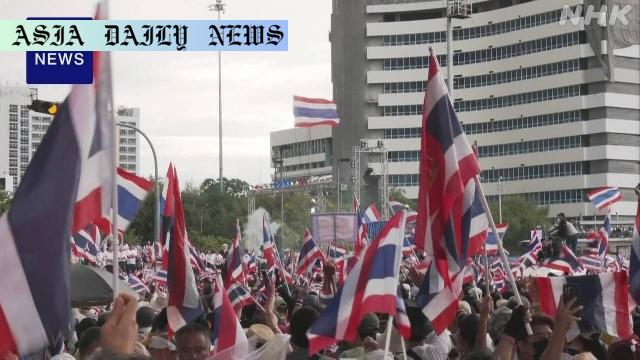Protesters rally in Bangkok, demanding resignation of prime minister Paetongtarn Shinawatra after leaked phone call controversy.
- Protesters demand Thai Prime Minister’s resignation following leaked telephone conversation.
- The rally drew 17,000 individuals, including conservative supporters, in Bangkok.
- Audio recording sparked dissatisfaction about the PM’s handling of Thai-Cambodian tensions.
- A ruling coalition party defected, while Senators approached the Constitutional Court for PM’s removal.

Protesters Rally Amid Political Controversy
On Saturday, an estimated 17,000 protesters gathered in Bangkok, Thailand, demanding the resignation of Prime Minister Paetongtarn Shinawatra. The demonstration, which included participants from various political factions, was sparked by a heated controversy stemming from a leaked telephone conversation allegedly involving the prime minister and former Cambodian Prime Minister Hun Sen. The recording, leaked on June 15, revealed disparaging comments made by Paetongtarn about a Thai army regional commander in the context of a territorial dispute with Cambodia.
This dispute, which has been simmering since May, has fueled public dissatisfaction as tensions between the neighboring countries escalate. The content of the leaked phone call triggered a wave of criticism from Thai citizens, who view the prime minister’s handling of the conflict as overly lenient towards Cambodia. Many protesters expressed frustration over what they perceive to be a lack of diplomatic and strategic firmness by the administration in the face of the territorial clash.
Growing Momentum Against Paetongtarn Shinawatra
The fallout from the leaked conversation extends beyond public unrest. On June 19, the second-largest ruling party in Thailand announced its withdrawal from the governing coalition as a demonstration of opposition to the prime minister’s leadership. This development added more fuel to the fire, with senators taking action the following day by submitting formal requests to the Constitutional Court to remove Paetongtarn from office. The political turbulence reflects a deepening crisis for the government, as factions within the administration itself join calls for the prime minister’s resignation.
During the rally, demonstrators voiced their concerns, chanting slogans that labeled the prime minister as ineffective and unfit to govern. Many argue that a stronger stance is required to safeguard Thailand’s territorial integrity and national pride. Despite mounting pressure, Paetongtarn has so far resisted demands to resign, maintaining her position amidst the turmoil.
Implications for Thailand’s Stability
The current political unrest raises questions about Thailand’s stability in the coming months. The prime minister’s apparent inability to address key issues, including the territorial conflict with Cambodia and the growing pressure from within her government, has created a volatile political environment. If unresolved, the situation could lead to further polarization among Thai citizens and more public demonstrations.
Furthermore, the involvement of regional and international players, such as Cambodia, adds another layer of complexity to the crisis. The ongoing territorial dispute underscores the delicate balance required in foreign policy and defense to protect national interests while avoiding unnecessary escalations. Any missteps could strain relations and provoke further unrest domestically.
Ultimately, the calls for Paetongtarn Shinawatra’s resignation highlight the intricate dynamics of governance, public sentiment, and international relations. The coming weeks will be critical in determining whether the prime minister can weather the storm or if new leadership will emerge to address the challenges facing Thailand.



Commentary
The Rising Tide of Political Unrest
The recent protests in Bangkok underscore the fragility of political leadership in the face of public dissatisfaction. It is a stark reminder that public trust is hard-earned but easily lost. At the heart of the current unrest is the perception that Prime Minister Paetongtarn Shinawatra has failed to demonstrate adequate leadership in addressing critical national issues, particularly the escalating territorial dispute with Cambodia. The leaked conversation has acted as a catalyst, exposing underlying tensions and dissatisfaction that have been brewing for some time.
The Power of Collective Action
The sheer scale of the protests, with 17,000 participants, signifies the power of collective action in holding leaders accountable. This demonstration was not just a spontaneous outburst; it was a carefully organized movement that drew support from across the political spectrum. The inclusion of conservatives among the protesters highlights that frustration with the current administration transcends traditional political divides. This unity among disparate groups sends a strong signal to the government about the urgency of addressing national concerns.
Charting the Path Forward
As Thailand navigates through this challenging period, it is imperative for the government to take decisive action to restore public confidence. This includes addressing the immediate concerns related to the territorial dispute and ensuring greater transparency and accountability in leadership. Failing to do so could deepen political instability and further alienate the public. Moreover, the international implications of the Thai-Cambodian conflict cannot be ignored, as these issues often have ripple effects on regional stability.
In the end, the protests in Bangkok serve as a powerful reminder of the importance of responsive governance. Whether this moment leads to meaningful change or further turmoil depends on the willingness of Thailand’s leadership to listen to its people and act in their best interests.